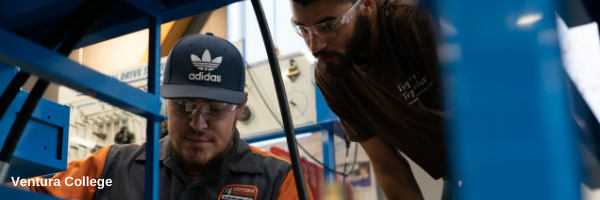In this Issue:
- Action Alert: Contact Your Legislators on the Budget
- Governor's May Revision Proposes a Once in A Lifetime Investment in Workforce Development
- Affordability, Food, and Housing Access Taskforce to Release Transportation Report
- Join Us for our Next GR Webinar: Tuesday, June 15 at 11:00 a.m.
- Federal Grant Opportunities
Action Alert: Contact Your Legislators on the Budget
We have a very limited opportunity to provide feedback on the Governor’s proposed May Revision to the January budget before the final votes are cast in June. Please take a few minutes to communicate the following with your Assemblymember and State Senator:
- We appreciate and support the proposed funding increase for community colleges in the May Revision. (In an email, consider adding a sentence or more about how the money will benefit your local institution(s)).
- We urge consideration of a one percent supplemental allocation to the base along the lines of the K-12 proposal to allow us to address longstanding structural and fiscal challenges.
- We urge funding in the budget to reform financial aid as proposed in AB 1456 (Medina and McCarty) and a categorical COLA for financial aid administration.
This year is undoubtedly unique as the state finds itself with an unprecedented $100 billion surplus ($75.7 billion in state revenues, $25 billion federal). Needless to say, the demands on this money are great as the state must address such diverse needs as COVID-19, homelessness, wildfires, water supply, and workforce development. The good news is the Governor has adopted the League’s call for an E-shaped recovery—that is based on equity—in contrast to where we stand now, a K-shape, where a select few benefit at the expense of everyone else.
Community colleges are the key to a recovery based on the principles of Diversity, Equity, and Inclusion (DEI), and the Governor’s May Revise recognizes that in several substantive ways. He proposes increasing the COLA from the January budget by $185.4 million to 4.05 percent; completely buying down the deferrals at a cost of $326.5 million over January; and providing $314.1 million (in addition to $250 million in federal funds) for deferred maintenance. There are many other pieces to the budget, particularly those focused on student support and workforce education, which are discussed in the May Revise Summary and the Joint Analysis of the Community College Budget.
Since January, the one constant refrain has been that your advocacy matters. While the League’s Government Relations team has had countless meetings with lawmakers and other policy officials, some by themselves and others with our student and faculty coalition partners, we continually hear how the grassroots message, that from our districts to lawmakers, makes the difference. We are certain that we would not have witnessed the success in the May Revise without the grassroots advocacy, which is exactly why we need your help one more time.
Act quickly in contacting your legislators with the message at the top of this article as there is no longer a luxury of delay. While your students and communities will be the ultimate beneficiaries of your successful advocacy, please know that your professional association, the Community College League, is deeply appreciative of your dedication, commitment, and action.
May Revise Talking Points
Governor's May Revision Proposes a Once in A Lifetime Investment in Workforce Development
As the state recovers from the pandemic, it has become apparent that we are experiencing a "K-shaped" recession where some Californians are better positioned to weather the economic impact of the recovery than others. Since last winter, the League has been advocating for an equitable or E-Shaped recovery where the state thoughtfully invests in supporting not just some Californians but focusing its resources on those with the greatest need. Under an E-shaped recovery, greater equity is achieved through educational opportunity and workforce development.
Subsequently, the Governor crafted his May Revision, or his California Comeback Plan, as a "once-in-a-lifetime opportunity to not only speed the state's recovery from the pandemic, but to address long-standing challenges and provide an opportunity for every California family—regardless of their income, race, or ZIP code."
The Governor's updated proposal recognizes the need to invest in workforce training. Workers may need to "reskill or upskill and put them on a path toward upward economic mobility and security." The proposal revealed earlier this month included "billions in additional investments that connect people with training, establish more quality jobs, and grow California's workforce."
Below is a summary of the Governor's recently announced workforce development proposals:
LEARNING-ALIGNED EMPLOYMENT
The Governor's first proposal would direct $1 billion of one-time General Fund (split evenly between fiscal years 2021-22 and 2022-23) to support an endowment managed by the University of California to sustain ongoing support. The effort would promote learning-aligned, long-term career development for UC, CSU, and CCC students by having campuses identify or establish partnerships with external employers. Funding for this program would prioritize learning-aligned employment opportunities for underrepresented students, particularly underrepresented students in STEM fields.
EDUCATION AND TRAINING SUPPORT GRANTS FOR DISPLACED WORKERS
The second program would be funded by $1 billion from the American Rescue Plan Act of 2021 (one-time in nature). The program would be aimed at all three public segments and administered by the California Student Aid Commission (CSAC). It would offer a one-time grant program to support displaced workers seeking reskilling and up-skilling, educational opportunities, or to support costs to start a business. CSAC will determine grant amounts with a minimum amount of $1,000 per grant and a maximum of $2,500. The participating segments would be encouraged to match grant funds with institutional funds.
REGIONAL K-16 EDUCATION COLLABORATIVES
The last effort that seeks collaboration between K-12 and higher education is the $250 million one-time General Fund set-aside grant program for regional K-16 collaboratives. The intent is to build 5 to 8 regional collaborative programs modeled after the Fresno K-16 Education Collaborative. The Governor's Office of Planning and Research would be the entity that would award the grants, and each proposal would be required to include at least one institution from each of the three segments. The regional plan must also consider the following items: regional workforce needs; focus on streamlining occupational pathways that lead to high-paying, in-demand jobs; align higher education with workforce needs; and adopt recommendations from the February 2021 Recovery with Equity report related to fostering inclusive institutions and facilitating student transitions.
CCC Specific Programs
Finally, the May Revision proposes the following increases for CCC workforce programs, with a combination of one-time and ongoing proposals:
- High Road Training Partnerships and Regional Partnerships—an increase of $20 million one-time Proposition 98 General Fund.
- CCC Strong Workforce—an increase of $12.4 million ongoing Proposition 98 General Fund to increase program funding by five percent.
- Work-Based Learning—an increase of $10 million one-time Proposition 98 General Fund to develop work-based learning opportunities in (1) cloud computing and (2) zero emissions and supply chain fields.
- Competency-Based Education Pilot—an increase of $10 million one-time Proposition 98 General Fund to pilot implementation of competency-based education at select community colleges.
- CCC Registry Modernization—An increase of $1 million one-time Proposition 98 General Fund to support the modernization of the CCC Registry, an online database of job opportunities.
The nonpartisan Legislative Analyst's Office released an analysis of the Governor's proposed workforce development plan. The report summarized the Governor's proposal as:
- 35 proposals spanning 13 agencies/departments
- $5.2 billion in total funding
- 98 percent of the funding is one time, 2 percent is ongoing
- 56 percent is federal funding, 44 percent is state funding
- The proposals span the higher education, labor, health, and social service sectors of the budget
The report also noted that "Women, persons of color, those without a college education, and persons with disabilities disproportionately fill less stable, lower-wage jobs, and have experienced a disproportionate share of job losses over the past year." But the analysis did raise questions about the scale and whether outcomes are measurable. The complete report can be found here.

Affordability, Food, and Housing Access Taskforce to Release Transportation Report
Within the next week, a group of CEOs and trustees who have been closely examining affordability challenges that impact our students will release a report on how to better help our low-income students obtain transportation services. It will focus on:
- A survey of how problems obtaining safe, reliable, and low-cost transportation can impact our students.
- Examples of successful programs colleges have implemented to reduce transportation costs for students.
- Policy recommendations for state, local, and college policymakers to consider.
The goal of this transportation report is to provide tangible solutions for college leaders to implement on their campuses and advocate for their delegations in Sacramento and Washington, DC. Please stay tuned for the release of the policy brief next week. A link to the taskforce’s previous reports on housing, general recommendations, and other materials can be found here.
Join Us for our Next Webinar: Tuesday, June 15 at 11:00 a.m.
Join the League's Monthly Government Relations Webinar on Tuesday, June 15 at 11:00 am for legislative and policy updates.
2021 Webinar Schedule
Every third Tuesday of the month, 11:00 a.m. - 12:00 p.m.
Tuesday, June 15
Tuesday, July 20
Tuesday, August 17
Tuesday, September 21
Tuesday, October 19
Webinar Details
Telephone Number: (646) 876-9923 or (669) 900-6833
Zoom Meeting ID: 623 780 059
Passcode: 550660
Registration
Be sure to register in advance for this meeting. After registering, you will receive a confirmation email with information about joining the webinar.

Federal Grant Opportunities
Presented by Downs Government Affairs
The League, in partnership with Downs Government Affairs, provides a list of federal grants to assist your community college in improving its programs and services. If you have any questions about the following grants, please feel free to reach out to Thomas Downs at TCDowns@downsgovaffairs.com.
For a full list of federal grants available to community colleges, visit our Federal Grants page at www.ccleague.org/federal-grant-opportunites
Upcoming Events
Board of Governors Meeting
May 24-25
2021 Classified Leadership Institute
June 9-11 | Online Virtual Event
Consultation Council
June 17
2021 CEO Leadership Academy
June 24-25 | Online Virtual Event
For more information, contact the League's Government Relations and Communications staff: advocacy@ccleague.org
Follow League Tracked Bills at www.ccleague.org/advocacy/bill-tracking
For news related to the State Budget and Policy visit www.ccleague.org/advocacy










